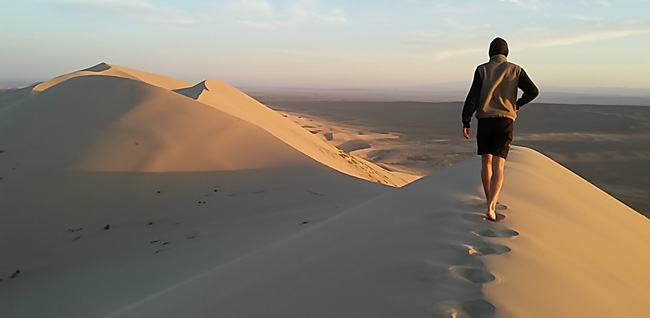Chloé Perdrix writes: the final leg of a journey
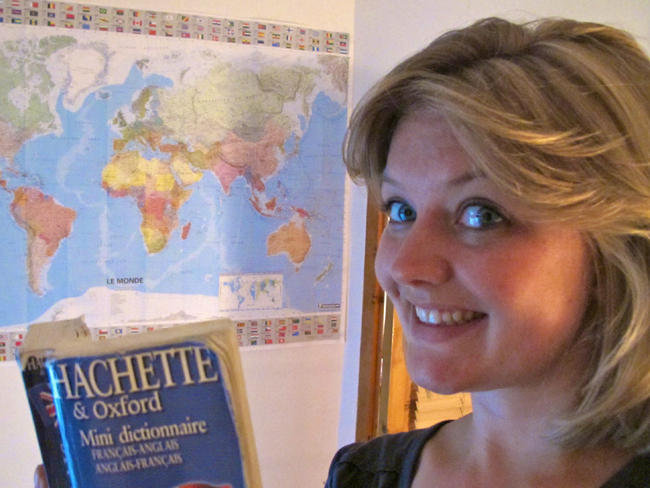
Chloé Perdrix is a young French GP who has taken a
sabbatical year travelling around Asia. In order to stay in touch with
the medical network, she has tried to meet general practitioners during
this journey. This is her final article - over the past year we have read her fascinating stories and felt the warmth of the welcome she has received from colleges. Next month she heads to the WONCA Europe conference in Istanbul. If you missed her earlier stories click here.
Primary care in Mongolia and Russia and reflections about my future in family medicine.
Time is going so fast! In few days, it will have been one year since my first article was edited in WONCA news. Do you remember? It was about Malaysia and traditional medicine in Orang Asli people who live in the jungle.
During this long journey, some people asked me: Aren’t you scared to have forgotten everything in medicine?
To be honest, I’m more stressed than scared. I imagine my ‘go back to work’ day like the first day in a new medical rotation in a new place. Like when I was a resident. But no, better than that. I trust in my brain. I won’t forget 10 years of studying as easily.
Furthermore, I have kept my medical knowledge up to date, by reading medical articles on internet, medical periodicals, and by going to medical congresses like next WONCA Europe Conference in Istanbul. I also practised medicine during my travel, and realized that reflexes I learned were still in my brain: I diagnosed an alcoholic coma in a man who was supposed to board a plane in few minutes and provided him the initial care before the airport medical team took charge of him; I took care of an infected sunburn; I found medication to treat a gout crisis in the Laos countryside; I diagnosed scabies and helped the person to find treatment in China; and I advised many travellers and local people who had questions about their health.
When you are a Family Doctor, you never stop being a family doctor, wherever you are.

My most recent professional experience was in Mongolia. Our parents had joined us for 15 days. As we were hiking on a steppe and walking next to a “Ger”/ “Yurt”, local people invited us to have a break. They offered us tea and oiled-fried pancakes with milk (typical food in Mongolia). They told us that one of the men had injured his right calf in the morning when he was mowing the lawn (don’t ask me why he did it since there is grass for kilometres on the steppes… Maybe to prepare food for animals during winter?).
I examined the injury. My first impression was that it was not so bad. The wound was not bleeding anymore and the skin was in a good state. But when I looked more closely, I discovered a 1cm deep injury. I felt the foot pulse but the neurologic exam was not good. Sensation was modified and asymmetric. A nerve was probably affected. I advised him to go to the nearest hospital as soon as possible. (He had been injured for more than eight hours). They called family in Oulan Bataar to get him with their car. He would go to the emergency room the next day. It was the quickest solution.
I advised him on how to heal his wound, gave him some paracetamol and disinfectant spray and really insisted on the importance of going to a hospital in order to explore the wound surgically and to vaccinate him against tetanus.
As I gave him advice, I guessed how his next day would be: a very long day of waiting. Indeed, I had already had a discussion with Mongol people who explained to me how health care is organised in Mongolia.
Each salaried person pays 7% of their salary to fund a public health system which provides a large assortment of medical care for free. But these people told me that when Mongol people can afford it, they subscribe in addition to a private insurance to have access to private clinics. They thought it was better “because medical staff where often better” and “mostly because the waiting time was shorter”. Public hospitals and health centres are overbooked and people have to wait, for example, two or three hours for a General Practice consultation.
In the opinion of these people, level of the public medical school was not very good, and Mongol medical students have to study medicine abroad. South Korea and Turkey are the main countries where Mongol medical students go.
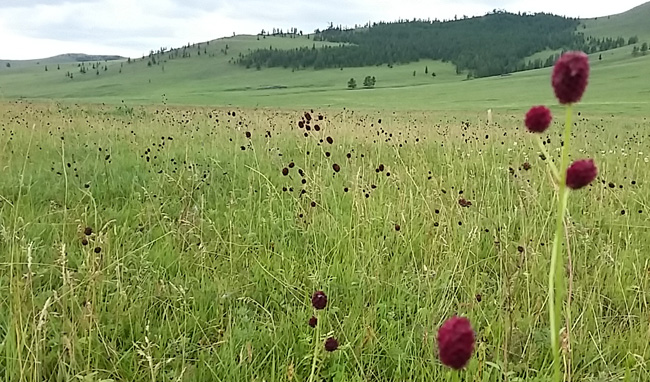
Photo: Medicinal Flowers used as infusion for stomacakes, Like eidelweiss for headakes, Mongolia
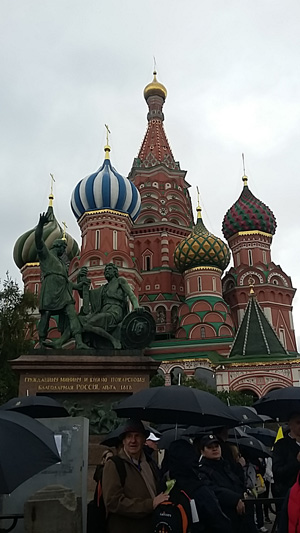
In Russia, I had the opportunity to visit two health centres. As in Mongolia, since the days of the Soviet Union, each district has a public medical centre where people can receive medical care for free. But because of the population growth, these public health centres don’t manage to take care of everyone, and the government’s funds provided to create more public health centres are not high enough. Consequently, some “half-public/half-private” health centres are being developed with the help of public funds. The second health centre I visited was one of them. It was built two years ago in a very new area of Moscow where a lot of young people and families settled.
Photo: St Basil's Moscow.
In Russia, the main topic which interested me was doctors’ salary (all specialties included) in public health centres or hospitals.
Some doctors told me their salary was no more than USD200 per month.
I made inquiries because I couldn’t believe it and found that in Russia, “medical doctors are included on the list of lowest-paid professions in the country”. The average salary of a doctor in Russia is approximately 28,000 roubles a month (= 367 Euros ; USD 414). Many Russian doctors make even less than that. (1)(2)
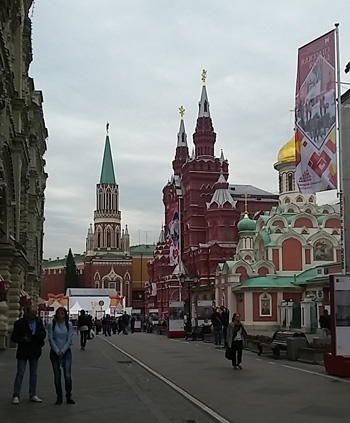
“The doctors’ profession hasn't left the top-10 least paid professions in the country for a few recent years (worse positions include only medical nurses, salespeople, secretaries and street cleaners). To get more, doctors have to work 1.5-2 times more than full-time, have additional jobs etc. Russian doctors have no time left for further training or self-education because of increased work loads. »(1)
Photo: The Kremlin, Moscow.
Based on data from the Russian Bureau of Statistics, the minimum wage in Russia is RUR 13,200 (=173 Euros ; USD 195) (against the average wage of RUR 18,300 nationwide (= 240 Euros ; USD 270) and RUR 35,600 (466 Euros ; USD 526) in Moscow). Currently, 1 euro = 75 RUR and 1 USD = 67,700 RUB.(1)
I talked to a Russian patient who was aware of this problem. She told me that her government considers professions who take care of people (like medical professionals or teachers etc) as “people who work for charity”, so they don’t pay them properly.
This Russian patient also told me about consequences of this professional under-consideration: Russian doctors leave Russia to work in another country where they can earn enough money. The second option is to work for pharmaceutical laboratories. Indeed, my patient said laboratories pay proportionally to the number of prescriptions they do that include their products. Knowing that, my new friend didn’t trust in any doctor and preferred taking care of her health by herself, as far as she could.
In conclusion, and to finish with more positive words, this break in my professional life made me understand and confirm how much I loved my job.
I can’t deny that our work is hard sometimes, requires long working hours, a lot of patience, and faces injustices. But we also must keep in mind that injustice is everywhere and can touch any kind of job. In that state of mind, I prefer having a job like ours which is mostly noble, useful, close to people, interesting in an intellectual and social way… the list is still long.
This wonderful adventure is reaching its end. Soon, I will come back to my French life. How will it be? Maybe difficult, maybe not… All I know is that I will never regret this life experience. It was the dream of my life and I fulfilled it. Now, I need to find another one ;-)
But before going back to France, Istanbul!
Chloé
Photo: Gobi desert, Mongolia (below)
